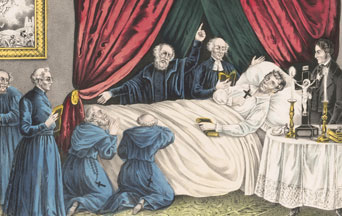
European liberals did not sympathize with the Irish Catholic movement. Daniel O’Connell fought for the freedom of the Church and against the errors of the French Revolution. In this struggle, he exclusively used legal means. He always avoided the revolutionary and violent methods so common in Europe at the time. These standards showed that the Church did not need the support of other forces to have her rights recognized. O’Connell’s triumphs encouraged all the emerging Catholic movements to avoid alliances with revolutionaries. Thus, this lack of association prevented the revolutionaries from achieving their goals of sabotaging the Catholic cause.
Liberals then resorted to their usual maneuvers to undermine O’Connell. Unable to diminish the great leader’s prestige in England, they imposed a complete silence about Ireland throughout the continent. At the same time, they attempted to infiltrate the Irish movement in order to distort its ideals.
Protestant prejudices and the English government’s obstinacy contributed mightily to this policy’s successes. Impatient, young people no longer wished to wait for the results that O’Connell obtained slowly but surely. They wanted immediate victory, even if it meant using violence against British rulers. Thus, “Young Ireland” was formed. Its primary purpose was to obtain freedom for Ireland at any price. These goals found an echo within O’Connell’s movement and broke its unity. That split embittered the Liberator’s last years. As if this trial were not enough, famine ravaged Ireland, killing a quarter of its population. Equally significantly, the potato famine caused the exodus of those unwilling to starve. Many of these took their revolutionary attitudes to the United States.
The fight against the famine and its consequences, plus the struggle against Young Ireland, consumed the elderly O’Connell’s remaining strength. Old and broken, he decided to go to Rome to consult the recently elected Pius IX about his country’s problems. En route, the “Beggar King” died in Genoa on May 14, 1847. As he succumbed, he bequeathed “his soul to God, his body to Ireland, and his heart to the pope.”
Eternal and Natural Law: The Foundation of Morals and Law
With O’Connell’s passing, Ireland lost one of her greatest glories. The Church lost a devoted and obedient son who gave her the first of a series of remarkable victories the ultramontanes achieved during the nineteenth century.
In 1875, a Dublin Catholic lord promoted great commemorations on the occasion of the centennial of O’Connell’s birth. The festivities truly consecrated the memory of the “liberator” and brought Catholics from all over the world to Ireland. French ultramontane Louis Veuillot, unable to attend, wrote a series of commemorative articles in the L’Univers. In one of them, he tells of the story of a visit of several French Catholics to O’Connell when he passed through Paris shortly before his death. Here are excerpts that show how successful the liberals’ campaign of silence had been:
“I had the good fortune to greet O’Connell a few days before his death when he crossed Paris on his way to Rome. There were no more than fifteen or twenty of us. All were strangers except for Montalembert, who was leading us. We formed more or less the entire Catholic party in this great [city of] Paris. Had Montalembert wanted to gather famous people, he would have risked going alone.
O’Connell, already dying, had gone out for a breather. We awaited his return under the arcades of the Rue de Rivoli, outside the modest hotel where he was staying. The day was ending—a sad and rainy winter day—and we were grudgingly taking stock of a setback our cause had just suffered in one of the Chambers. As usual, the effort was defeated with contempt. That was our typical situation. Our small numbers also embarrassed us. O’Connell, we said, has an entire people behind him. At that moment, he was returning. We saw him in his car and took our hats off. Some passers-by asked us who he was.
“It’s O’Connell.”
“Ah!… Who’s O’Connell?”
One of us, the physician J.P. Tessier, a first-rate mind and heart who died soon afterward without memory and whom freedom would have brought out of the shadows, answered:
“He is nobody, [just] a [common] man.”
And turning to me:
“Poor Ireland, poor freedom, this man is dead!”
“We went up saddened,” Veuillot continues. “And O’Connell received us despite his fatigue. We remember him sitting in an armchair, surrounded by blankets, pale and tired. Montalembert addressed him, and he answered with a few barely audible sentences: “Don’t be discouraged… I am dying… to reach Rome… Courage!”
At that moment, a dying, voiceless and motionless O’Connell was God’s visible force among men, the secular arm of the Church. We were in the cradle, and the one we rightly regarded as our leader was a corpse. We left with a broken soul. It seemed that everything was over, and the long night would resume its empire without O’Connell. “Not so!”Tessier tells me. “The grain must die; the sower is falling, but he has sown, and the seed will germinate. Let us wait [for spring].”

